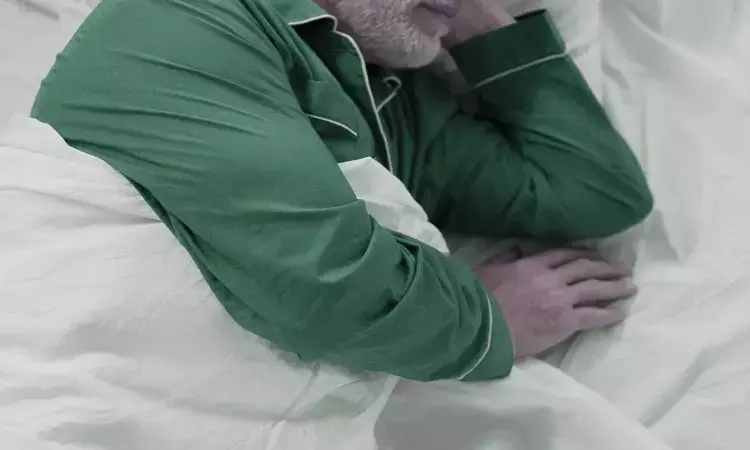- Home
- Medical news & Guidelines
- Anesthesiology
- Cardiology and CTVS
- Critical Care
- Dentistry
- Dermatology
- Diabetes and Endocrinology
- ENT
- Gastroenterology
- Medicine
- Nephrology
- Neurology
- Obstretics-Gynaecology
- Oncology
- Ophthalmology
- Orthopaedics
- Pediatrics-Neonatology
- Psychiatry
- Pulmonology
- Radiology
- Surgery
- Urology
- Laboratory Medicine
- Diet
- Nursing
- Paramedical
- Physiotherapy
- Health news
- Fact Check
- Bone Health Fact Check
- Brain Health Fact Check
- Cancer Related Fact Check
- Child Care Fact Check
- Dental and oral health fact check
- Diabetes and metabolic health fact check
- Diet and Nutrition Fact Check
- Eye and ENT Care Fact Check
- Fitness fact check
- Gut health fact check
- Heart health fact check
- Kidney health fact check
- Medical education fact check
- Men's health fact check
- Respiratory fact check
- Skin and hair care fact check
- Vaccine and Immunization fact check
- Women's health fact check
- AYUSH
- State News
- Andaman and Nicobar Islands
- Andhra Pradesh
- Arunachal Pradesh
- Assam
- Bihar
- Chandigarh
- Chattisgarh
- Dadra and Nagar Haveli
- Daman and Diu
- Delhi
- Goa
- Gujarat
- Haryana
- Himachal Pradesh
- Jammu & Kashmir
- Jharkhand
- Karnataka
- Kerala
- Ladakh
- Lakshadweep
- Madhya Pradesh
- Maharashtra
- Manipur
- Meghalaya
- Mizoram
- Nagaland
- Odisha
- Puducherry
- Punjab
- Rajasthan
- Sikkim
- Tamil Nadu
- Telangana
- Tripura
- Uttar Pradesh
- Uttrakhand
- West Bengal
- Medical Education
- Industry
Early birds or night owls: Early bedtime best for Diabetes patients

Early to bed, early to rise…while the old saying promises health, wealth and wisdom a new study offers more specific health benefits.
Earlier studies have suggested that evening chronotypes may be more susceptible to obesity-related metabolic alterations. However, whether device-measured physical behaviors differ by chronotype in those with type 2 diabetes is not known.
Researchers have found in a world first study that people who go to bed early are more likely to be in better health and more physically active compared to night owls.
Conducted by the University of Leicester and the University of South Australia, the study assessed the bedtime preferences (sleep chronotypes) of people with type 2 diabetes, identifying a connection between bedtimes and healthy, active lifestyles.
It found that night owls (people who went to late and got up late, or 'evening chronotypes') have an excessively sedentary lifestyle characterised by low levels and low intensities of physical activity – and that this is putting their health at greater risk.
Therefore there is a need for large-scale interventions to be implemented into diabetes care which support people with T2DM to initiate, maintain and achieve the substantial benefits of an active lifestyle. This may be particular pertinent for those with an 'eveningness' preference.
Type 2 diabetes is largely the result of excess body weight and physical inactivity. Globally 463 million people – or one in 11 adults have diabetes – a statistic that is expected to rise to 700 million by 2040.
Concerningly, 1.9 billion adults are overweight, with 650 million of these are obese.
As the global prevalence of type 2 diabetes and obesity continue to rise, finding ways to negate these health issues is critical.
Lead researcher, Dr Joseph Henson from the University of Leicester says understanding how people's sleep time preferences can impact their level of physical activity, could help people with type 2 diabetes better manage their health.
"There is a massive need for large-scale interventions to help people with diabetes initiate, maintain and achieve the benefits of an active lifestyle," Dr Henson says.
"For people who prefer to go to bed later and get up later, this is even more important, with our research showing that night owls exercise 56 per cent less than their early bird counterparts.
"Exercise plays an important role for people with diabetes, helping maintain a healthy weight and blood pressure, as well as reducing the risk of heart disease – all significant factors for improving diabetes management.
"This makes understanding the factors that can mitigate a person's propensity to exercise, extremely important."
Published in BMJ Open Diabetes Research & Care, the study examined 635 patients with type 2 diabetes, each wearing an accelerometer for seven days to record the intensity and time of different physical behaviours: sleep, rest, overall physical activity.
The study found 25 per cent of participants had morning chronotypes (a preference to go to be early and get up early, with an average bedtime of 22:52); 23 per cent had evening chronotypes (a preference to go to bed late and get up late, with an average bedtime of 00:36); and 52 per cent said they had neither.
UniSA's Dr Alex Rowlands says the study provides a unique insight into behaviours of people with type 2 diabetes.
"The links between later sleep times and physical activity is clear: go to bed late and you're less likely to be active," Dr Rowlands says.
"As sleep chronotypes are potentially modifiable, these findings provide an opportunity to change your lifestyle for the better, simply by adjusting your bedtime."
"For someone with diabetes, this is valuable information that could help get them back on a path to good health."
Dr Kamal Kant Kohli-MBBS, DTCD- a chest specialist with more than 30 years of practice and a flair for writing clinical articles, Dr Kamal Kant Kohli joined Medical Dialogues as a Chief Editor of Medical News. Besides writing articles, as an editor, he proofreads and verifies all the medical content published on Medical Dialogues including those coming from journals, studies,medical conferences,guidelines etc. Email: drkohli@medicaldialogues.in. Contact no. 011-43720751


